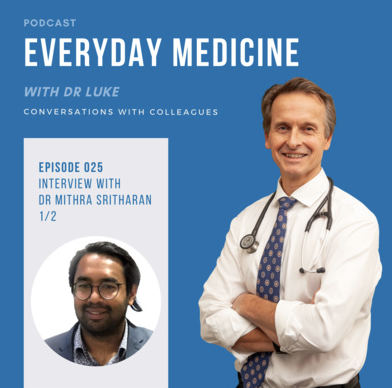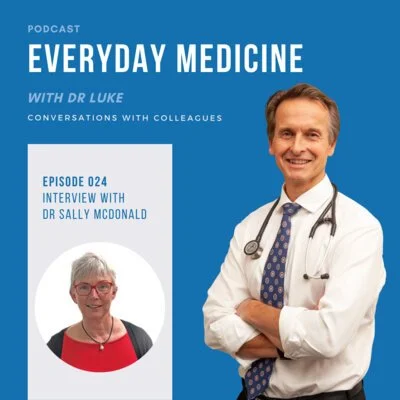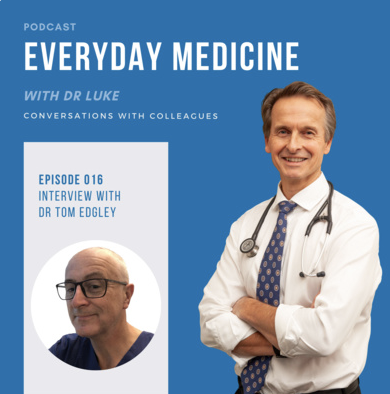Everyday Medicine by Dr Luke Crantock
Conversations with colleagues providing helpful ideas and advice in healthcare
Episode 29. Personalised Medicine with Dr Sem Liew
Personalised medicine also known as precision medicine uses the knowledge of genetics to help predict disease development and to influence decisions about lifestyle choices and to tailor treatment to a particular individual's tumour. The hope is that personalised medicine will allow more appropriate choices of targeted therapy and minimise side effects rather than choosing a "one size fits all" approach to prescription medication.
Episode 28. Immunotherapy with Dr Sem Liew
Cancer is responsible for over 40,000 deaths annually in Australia and has traditionally been managed by modalities including surgery, radiotherapy and chemotherapy. In 1992, Tasuku Honjo's discovery of checkpoint proteins on tumour cells led to the birth of immunotherapy which has revolutionised the treatment of many cancers including bladder and kidney cancer, head and neck cancer, melanoma, non-small cell lung cancer and Hodgkin's lymphoma.
Episode 27. Robotic Knee Surgery with Mr Andrew Tang
In this podcast episode we have a conversation with Mr Andrew Tang, Director of the Epworth Musculoskeletal Clinical Institute and an experienced orthopaedic surgeon operating at Epworth Richmond and St John of God Berwick since the early 1990's.
Episode 26. Pancreatic Cysts with Dr Mithra Sritharan
As clinicians we are often faced with the dilemma of working up cystic structures in the pancreas. These may have been discovered incidentally but may also be clinically relevant and contributing to symptoms. In this podcast episode we are joined by Mithra Sritharan a hepatopancreaticobiliary and general surgeon with a particular interest in liver and pancreatic disease, but whose management skills and high level of competence is evident from this interview.
Episode 25. SOL's Liver with Dr Mithra Sritharan
Our approach to space-occupying lesions (SOL's) in the liver is dependent on a firm knowledge of the potential pathology, the choice of imaging modality and the understanding of any background clinical liver disease in the index patient.
Episode 24. Palliative Care with Dr Sally McDonald
In this episode, we talk with experienced general practitioner Dr Sally McDonald who has committed a large part of her time, energy and emotion providing palliative care for her local community.
Episode 23. Epilepsy with Dr Doug Crompton
Seizures may be defined as a transient disturbance of cerebral function due to abnormal paroxysmal neuronal discharge in the brain with epilepsy defined by any disorder characterised by recurrent (more than two) unprovoked seizures. It is estimated that 1-2% of the Australian population experience epileptic seizures in adult life and up to 4% of children experience epileptic seizures
Special Episode 1. COVID-19 Vaccinations with Professor Gabriel Barbash
Australia is in the dawn of its vaccination program against SARS-COV2, inoculations commenced this week among frontline health workers and aged care residents as well as our Prime Minister. By comparison, Israel’s vaccination rollout has been the fastest in the world, half the population has received one dose already and one third has received both inoculations.
Episode 22. Stroke with Dr Doug Crompton
It is estimated that more than 56,000 strokes will be experienced by Australians this year (new and recurrent) and that half of Australians are living with the effects of a stroke which remains the third leading cause of death in Australia and kills more women than breast cancer and more men than prostate cancer. As more than 80% of strokes may be prevented and four in 10 stroke survivors have a recurrent stroke within a decade it is very important we understand the aetiology of strokes and how we may intervene effectively to reduce incidence and morbidity.
Episode 21. IDDM with Dr Chin Tan
It is estimated that 130,000 Australians have been diagnosed with insulin dependent diabetes mellitus with about seven new cases per day. Approximately 60% of the diagnoses are in children and young adults under the age of 25 years. As IDDM is an autoimmune disease resulting in the destruction of insulin producing cells, glycaemic control is obtained through the administration of insulin. There have been several recent advances in continuous glucose monitoring and insulin delivery to review.
Episode 20. Endoanal ultrasound and anorectal physiology with Dr TC Nguyen
Endorectal ultrasonography combined with anorectal physiology allows the evaluation of the constituents of the wall of the anal canal and the scientific understanding of anorectal pathophysiology. It is very important to appreciate a patient's anorectal dynamics before initiating an effective management strategy for what may be a wide variety of pelvic-anorectal disorders.
Episode 19. Robotic Surgery with Dr TC Nguyen
Robotic assisted surgery allows doctors to perform complex procedures with more precision, flexibility and control than is possible with conventional techniques. Now used in many forms of surgery including cardiac, prostatic and orthopaedic, in this episode we are joined by the dynamic and highly skilled Mr T C Nguyen who discusses
Episode 17. CBD with Dr Sud Agarwal
Medical cannabinoids are derived from the cannabis sativa plant. There are 144 known cannabinoids, THC is perhaps the best known for its psycho-active effects, however cannabidiol (CBD) is now being recognised for its many medical applications.
Episode 16. Trauma Courses with Dr Tom Edgley
In 2019 experienced anaesthetist Dr Tom Edgley was left to defend his two properties in the rural and bushy enclave of Tonimbuk from the disastrous fires claiming over 26 properties in the region. Not only did Tom survive protecting his properties from the fire, but he also lent a major hand to his neighbours and was involved in the emotional rehabilitation of his community.
Episode 15. Type 2 Diabetes with Dr Chin Tan
In this episode we have a conversation about Type 2 diabetes, a condition that affects at least 1.2 million Australians (5% of Australians) and for which there are a complex number of pharmacologic treatment strategies available.
Episode 14. Faecal Microbiota Transplant with Dr Darcy Holt
The transfer of stool from a healthy donor into the gastrointestinal tract of a recipient (FMT) at first consideration does not seem like a reasonable or scientific approach to the treatment of gastrointestinal diseases. Historically however, it has been used by communities for over 3,000 years, gaining credibility in 1958 after a paper by Eisemen in Denver who described treating pseudomembranous colitis this way.
Episode 13. Biologics and Small Molecules in IBD with Dr Darcy Holt
DARCY HOLT - BIOLOGICS AND SMALL MOLECULES FOR INFLAMMATORY BOWEL DISEASE Biologic agents (produced in living organisms or containing components of living organisms) coupled with a variety of new small molecules (acting in novel ways to influence the human immune system) have dramatically improved medical management of inflammatory bowel disease.
Episode 12. IBD with Dr Catherine Sorrell
Inflammatory Bowel Disease (IBD) affects approximately 85,000 Australians and 5 million people worldwide and includes Crohn's disease and ulcerative colitis. These conditions may have a major impact on patient's quality of life.
Episode 11. Spinal Cord Stimulation with Dr Paul Verrils
Australia has led the world in pain management, interventional techniques and pain research including in the management of severe and debilitating axial and musculoskeletal pain via spinal cord and DRG stimulation as well as in several evolving techniques for the management of visceral pain.




















